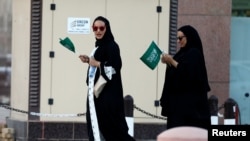A senior Saudi cleric and a health ministry official said women should be allowed to work as paramedics and opticians, Saudi newspapers reported on Monday, part of a push to relax strict labor codes in the ultra-conservative kingdom.
The government announced an economic reform plan in June that aims to increase the number of women as a proportion of the workforce to 28 percent from 23 percent by 2020 and to quadruple the number of women in senior civil service roles to 5 percent.
Saudi Arabia is the only country where women are forbidden to drive, making it harder for them to get to work. Regulations also bar them from certain professions, while rules on gender mixing in shops and businesses further limit job opportunities.
"It's fine [for a woman] to work as a paramedic, provided she's decent and in the lawful attire," a senior member of the state-appointed body of clerics, the Lama, Sheikh Abdullah al-Manea told the Okaz daily.
Women are already allowed to work as doctors and have volunteered as medics in Mecca during the haj pilgrimage for the past few years, with similar requirements for modest dress.
Mohammad Bajbair, a senior health official in the Red Sea commercial hub of Jeddah, told the Saudi Gazette that women could work in opticians' shops as long as they do not mix with men.
"If a complaint is received by the health affairs department about the mixed environment then the shop might be closed down," said Bajbair.
Out of 144 nations, only Iran, Yemen and Syria place lower than Saudi Arabia in a gender equality ranking compiled by the World Economic Forum.
Saudi Arabia's economic plan envisages weaning the economy off its high dependence on oil and increasing the range of jobs available to citizens.
It does not specifically mandate more open social mores in Saudi Arabia, the land where Islam was born, but it challenges decades of ultra-conservative practice by seeking to open theme parks and cinemas to boost the entertainment sector.
The plan provided few concrete details on how to boost female employment but said the government aims to spend 2.78 billion riyals ($741.19 million) to improve transport options for working women.
The government's newly refashioned sovereign wealth fund has also invested $3.5 billion in U.S. ride-hailing service Uber, a popular tool for transportation among Saudi women.
($1 = 3.7507 riyals)





